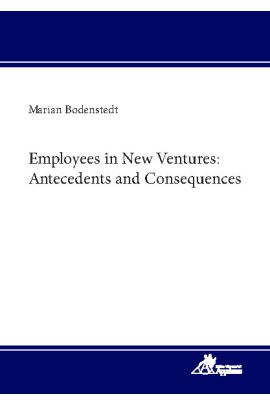This dissertation investigates the role of employees in new ventures, as anecdotal empirical evidence shows that these employees play an important role in new ventures’ development. While successful founders often point to their early hires and how these hires contributed to their ventures’ success, the entrepreneurship literature lacks sufficient research on such hires. Therefore, this dissertation investigates how employees’ human capital develops over time and how it influences ventures’ outcomes. The dissertation also shows empirically how its results can be used in practice to optimize team structures and how data analytics can inform human resources.
The main body of the dissertation consists of three research studies. Research study 1 finds that the human capital of new ventures’ employees is formed through a mechanism of legitimacy and homophily, so the founding team and other early executives tend to hire employees who are similar to themselves. This effect strengthens when employees are recruited through existing network ties. Research study 2 investigates the outcomes of employees’ human capital and finds that non-managerial employees contribute to ventures’ success through two mechanisms: a direct effect of their task work and an indirect complementary effect on star scientists and executives. The indirect effect shows the interdependence of human capital resources in new ventures and how the level of human capital is related to outcomes. Finally, research study 3 investigates how an outside-in external dataset can be combined with novel machine learning techniques to create practical insights for human resources practitioners.
This dissertation contributes to research in several ways. Entrepreneurship research moves forward by adding employees to the list of new ventures’ success factors. Research on organizational development in new ventures is advanced by the finding that employees join ventures as an outcome of considerations of legitimacy and similarity, especially when new ventures hire primarily through network recruiting. Human capital theory is informed by the result that individuals in new ventures should be treated holistically and by considering interdependencies. These contributions offer a starting point for entrepreneurship and human capital scholars who seek new avenues of research related to employees in new ventures.
| Autor | Bodenstedt, Marian |
|---|---|
| Lieferzeit | 3-4 Tage |
| Gewicht | 0.356 kg |
| Erscheinungsdatum | 07.09.2020 |

